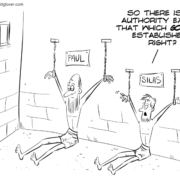Chris Marshall | Monday, 1st June 2015
Read the first part of the series here.
In the first instalment of this series, Chris asserted that most Christians are "disturbingly deaf to the political dimensions of Jesus’ preaching and practice, and to its far-reaching implications for shaping an authentically Christian political witness today." He then went on to discuss reasons for this 'depoliticisation of Jesus', namely narrow concepts of "politics" amongst modern Christians, and the distorting influence of post-Enlightenment individualism on interpretations of Jesus' ministry. Here Chris discusses additional factors in the perpetuation of the depoliticisation of Jesus.
THE DEPOLICISATION OF JESUS (continued)
3. Fragmentary reading strategies: A third factor contributing to the prevalent depoliticisation of Jesus are the atomistic reading strategies employed by gospel readers and interpreters. All attention gets focused on isolated sayings of Jesus, or individual miracle stories, or the meaning of particular parables, with little consideration being given to how these individual items fit into the larger story being told by the evangelists or how they reflect the economic and socio-political realities of the first-century world in which the story is set.
This fragmentary approach is commonplace in both popular and scholarly approaches to the gospels. At a popular level, most preaching and devotional reading of the gospels concentrates on small tracts of text separated off from the larger narrative setting. Similarly church lectionaries, although a very ancient and helpful tool for engaging the full witness of Scripture, still do make a virtue out of breaking the gospel accounts down into very small units and distributing them throughout the year. More concerning however is what many gospel critics do. In the name of sound historical method, critical scholars apply “scientific” tests of authenticity to the Jesus-tradition in order to siphon off material that can be considered to be historically reliable. The limited amount of data extracted by this method is usually predominantly sayings-material—things Jesus said more than things Jesus did—since it is much harder to validate the historicity of third-person narratives which are full of fantastic features and clearly serve as Christian propaganda. The resulting collection of “authentic” sayings and parables are then treated as repositories of meaning in their own right, independent of the literary or historical context in which they occur in the gospel tradition.
The problems with this approach are manifold, not the least being that it inevitably reduces Jesus to a dehistoricised “talking head”, someone who hovers serenely above the mundane circumstances of ordinary life and communicates moral or spiritual insights in the form of decontextualised aphorisms, proverbs and parables, or by the occasional striking deed. But no real human being ever communicates that way. No one limits their speech to short sentences or brief sound bites unrelated to specific situations and disconnected from ongoing human relationships, or unhooked from the shared traditions, experiences and meanings of their audience. To try to understand the significance of Jesus’ words and deeds without reference to the concrete social and political circumstances of actual Jewish communities under Roman rule is like trying to understand the sermons and speeches of Martin Luther King without reference to the bitter legacy of American slavery, the injustices of segregation, and the struggles of the civil rights movement.[1]
The only way, then, to do justice to the individual words and deeds of Jesus is always to view them within the context of the larger gospel narrative of his life and mission, rooted as it is, and as Jesus himself historically was, is in the real life world of colonial Palestine, where prophetic and messianic movements of liberation were constantly springing up.
4. Jesus the prophet: Several times I have referred to Jesus as a Jewish prophet. There can be little doubt that the gospel writers present Jesus in such terms,[2] and in a good number of his own sayings Jesus refers to himself as a prophet.[3] His repeated warnings of impending judgment on the nation and its rulers are also evidence of Jesus’ prophetic persona.[4] It is precisely in his guise as a prophet that Jesus exercises such a politically-charged role. Much the same could be said for his messianic identity. It is extremely likely that Jesus saw himself as Israel’s awaited messiah, even if he was decidedly chary about employing the title itself, and he was indisputably executed by Pilate as a messianic pretender.[5] To claim messiahship was to assert a political function, since the most common expectation of the coming messiah is that he would be a princely warrior who would defeat God’s enemies, restore the throne of David, and lead Israel to universal sovereignty over the nations.
Yet there has been a curious reluctance among Christian interpreters to take seriously Jesus’ prophetic and messianic significance. This reluctance again has both popular and scholarly expressions. At a popular theological level, it is Jesus’ divinity that usually squeezes out his prophetic credentials. Jesus was not just a prophet, Christian apologists (rightly) insist, he was the incarnate Son of God, a divine being, not just a human being. Jews and Muslims may honour Jesus as a prophet, but, they (rightly) urge, we Christians know him as God’s only begotten son.
At a scholarly level, it is Jesus’ messianic self-consciousness that is more disputed. Many gospel critics are unconvinced that Jesus saw himself as a messiah, and while they may allow him the label of prophet in lieu, even that identity is stripped of much political content. There is even one strand of American scholarship that has now demoted Jesus further from the status of prophet to that of peasant sage or wisdom teacher or Cynic-like philosopher. These scholars, reacting negatively to the apocalyptic fantasies of American fundamentalism, strip Jesus’ preaching of all traces of apocalyptic judgment, leaving behind a harmless wandering bard who travelled around the countryside “teaching an alternative hippie-like lifestyle to a bunch of rootless nobodies”.[6] Why anyone, least of all Pilate, would want to crucify such a person is difficult to fathom.
But the evidence that Jesus considered himself to be a prophet, and was regarded by his contemporaries as such, is overwhelming. It is true that his closest followers soon came to regard him as much more than a prophet,[7] but they never saw him as less, and it was in the basic mould of a prophet that Jesus made his most decisive political impact. “Prophet” was a fluid category in Jesus’ day, embracing a wide diversity of functions and emphases.[8] Some prophets were clerical and establishment figures, others were more scholarly types; some were lone wolfs delivering oracles of judgment or deliverance, others were popular leaders of mass movements who modelled themselves on the great prophetic figures of the past, like Moses, Joshua and Elijah, and who proclaimed God’s imminent intervention to bring deliverance from Roman servitude and idolatry. Jesus fits best into this latter category of a popular prophet leading a proletarian movement of liberation and renewal, centred on a distinctive understanding of God’s kingdom and its implications. Distinctive it certainly was, especially in its foreswearing of hatred and violence toward the enemy, but it was not apolitical, for, as Wright observes, “anyone who was announcing God’s kingdom … was engaging in political activity. The question is, rather, what sort of politics were they undertaking, and with what end in view”.[9]
5. A kingdom not of this world: The four factors I have discussed so far that have served to depoliticise Jesus—the spurious separation of religion and politics, the distorting grid of Western individualism, the fragmenting of the gospel story into isolated bits and pieces, and the discomfort with Jesus’ prophetic or messianic office—all come to roost in the actual exposition of the text. Those who not only miss but positively resist the idea of a politically engaged Jesus cite two texts in particular as proof that Jesus wasn’t much concerned with political affairs. The first is Jesus’ response to Pilate’s question about whether he considered himself to be the king of the Jews
Then Pilate entered the headquarters again, summoned Jesus, and asked him, “Are you the King of the Jews?” … Jesus answered, “My kingdom is not from this world. If my kingdom were from this world, my followers would be fighting to keep me from being handed over to the Jews. But as it is, my kingdom is not from here.” Pilate asked him, “So you are a king?” Jesus answered, “You say that I am a king. For this I was born, and for this I came into the world, to testify to the truth. Everyone who belongs to the truth listens to my voice.” (John 18:35–38)
This text more than any other has been used by conservative interpreters to encourage Christian quietism and disengagement from political or social justice issues, since the kingdom which Jesus proclaims “is not of this world….it is not from here”. It is a heavenly, not an earthly, kingdom. The second text comes from the so-called Tribute Question passage, where Jesus is asked directly about whether it is acceptable to support Caesar’s regime through paying taxes.
Then they sent to him some Pharisees and some Herodians to trap him in what he said. And they came and said to him, “Teacher, we know that you are sincere, and show deference to no one; for you do not regard people with partiality, but teach the way of God in accordance with truth. Is it lawful to pay taxes to Caesar, or not? Should we pay them, or should we not?” But knowing their hypocrisy, he said to them, “Why are you putting me to the test? Bring me a denarius and let me see it.” And they brought one. Then he said to them, “Whose head is this, and whose title?” They answered, “Caesar’s.” Jesus said to them, “Give to Caesar the things that are Caesar’s, and to God the things that are God’s.” And they were utterly amazed at him (Mark 12:13–17).
Upon this text a thorough-going, and thoroughly baleful, “two kingdoms” theology has been constructed, according to which the State is deemed to have rightful charge of social and political affairs, while the church has control of spiritual and religious matters.[10] Christians must therefore be good, obedient citizens in society in recognition of Caesar’s legitimate authority, but they should concentrate most of their energies in developing their relationship to God and serving the church, and leave worldly affairs to those whom God has appointed to rule. It would be no exaggeration to say that without this reading of Jesus’ famous words “render unto Caesar what is Caesar’s and to God what is God’s”, reinforced by Paul’s call to Christian submission to ruling authorities in Romans 13:1–6, the Nazi holocaust might never have happened.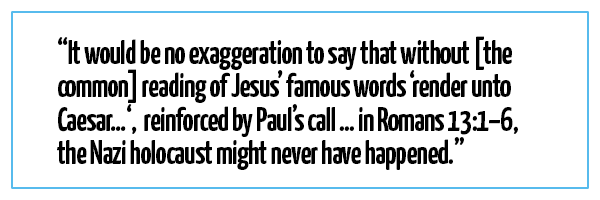 There is no time to exegete either of these two passages in detail here.[11] Suffice it to say that the familiar readings of both texts are dangerously misguided. Even in the context of John’s Gospel—the most “spiritual” of all the gospels—Jesus’ saying “my kingdom is not of this world” cannot be taken as an affirmation that God’s kingdom is a purely spiritual reality unrelated to worldly realities. After all it was out of love for this world that God sent Christ into the world in the first place, in order that “through him the world might be saved” (John 3:16–17). The term “kingdom” here, as always in biblical tradition, has the active force of “rule” or “kingship” or “power” more than place or territory or realm, so that what Jesus is really saying is that his style of exercising kingly authority is unlike that of other kings. His kingship conforms, not to brutal coercive rule of Herod or Caesar or Caiaphas, but to the compassionate, healing rule of God. It does not rest on violent coercion but on loving persuasion.
There is no time to exegete either of these two passages in detail here.[11] Suffice it to say that the familiar readings of both texts are dangerously misguided. Even in the context of John’s Gospel—the most “spiritual” of all the gospels—Jesus’ saying “my kingdom is not of this world” cannot be taken as an affirmation that God’s kingdom is a purely spiritual reality unrelated to worldly realities. After all it was out of love for this world that God sent Christ into the world in the first place, in order that “through him the world might be saved” (John 3:16–17). The term “kingdom” here, as always in biblical tradition, has the active force of “rule” or “kingship” or “power” more than place or territory or realm, so that what Jesus is really saying is that his style of exercising kingly authority is unlike that of other kings. His kingship conforms, not to brutal coercive rule of Herod or Caesar or Caiaphas, but to the compassionate, healing rule of God. It does not rest on violent coercion but on loving persuasion.
That is why in the second part of the verse, which is hardly ever quoted by conservative apologists, Jesus explains that “if my kingdom were from this world, my followers would be fighting to keep me from being handed over to the Jews”. The thing that most differentiates Jesus’ kingship from worldly forms of kingship is its non-violence. His authority is “not from here”—it is not molded by realpolitik considerations. If it were, his followers would have launched a violent campaign to seize Jerusalem and install him on throne. Instead God’s kingdom exerts its power by peaceful means. It is still a political reality (it is still about power), but it embodies the politics of peace, not the politics of conquest.
Jesus’ reply to the question about tribute points in the same direction. Jesus’ enemies seek to trap him with a Catch-22 question: “Is it lawful for us to pay taxes to Caesar or not?” Both Jesus’ questioners and Jesus himself knew full well that, according to God’s law, it was unlawful to offer homage to a pagan ruler who blasphemously claimed universal sovereignty for himself. In recent memory Jewish radicals had gone to horrifying deaths for their refusal to pay tribute to Caesar in the name of the first commandment: “You shall have no other gods before me”. But both parties also knew full well that, according to Roman law, it was obligatory to pay taxes and tribute to the imperium. So Jesus was trapped. If he endorsed taxation, he was in open breach of the Torah, at least in the eyes of the faithful. If he opposed taxation, he was in defiance of Rome and could well have to pay for it with his life.
In a brilliant riposte, Jesus evades the trap by snaring his opponents in their own petard. First he asks his interrogators to show him a denarius, the Roman coin used for tribute payment. The very fact that they can so quickly produce a coin exposes the insincerity of their inquiry. For their very possession of foreign currency confirmed that his questioners had themselves already opted for subservience to Rome, even while provoking Jesus to declare his Torah-based opposition to it. Jesus then asks them to verbalise whose image (eikon) and whose title the coin bore. In doing this he was both deliberately underscoring the blasphemous nature of the inscription on the coin, which ascribed deity to the emperor (“Tiberius Caesar, Augustus, Son of the Divine Augustus”), and reminding his hearers of who God’s true image bearers in the world really are, namely God’s own people (cf. Gen 1:27). Only then does Jesus make his climactic declaration about rendering to Caesar what is his due and to God what is his.
Given that Jesus had first intentionally highlighted the idolatrous nature of Caesar’s coinage, it is unthinkable that his final pronouncement was intended to be a straightforward endorsement of his listeners’ obligation to pay their taxes, though this is how it is often interpreted.[12] If his words amounted to an unambiguous affirmation of Rome’s right to levy tribute, it is hard to see how his enemies could construe them as sedition and report him to Pilate for “perverting our nation and forbidding us to pay taxes to Caesar” (Luke 23:2). If anything, Jesus’ statement is more naturally taken as a bold declaration of independence from Rome’s tribute-generating machine. But Jesus stops short of explicitly forbidding payment of tribute. Instead he draws attention to the fundamental principle at issue: One must first be clear on what rightfully belongs to Caesar and what rightfully belongs to God, then decide on the specifics of tribute. Of course every Jew knew the “earth is the Lord’s and everything in it” (Psalm 24:1), and that their political allegiance was owed exclusively to Yahweh alone. That meant that nothing belonged of right to Caesar, least of all the God-given land of Israel and its produce (cf. Lev 25:23).
It does not follow from this, however, that Jesus was encouraging outright tax refusal by his Jewish compatriots, which would have been catastrophic. Instead he was inviting them to reframe the meaning of the payment they must make by turning it from a symbol of subservience into a symbol of resistance. Since Israel’s God is lord of all, Caesar could legitimately claim ownership to nothing—except one thing, the despicable coins minted in his own honour. So in returning these idolatrous coins to their pagan owner, albeit in the form of coercive taxes, Jesus’ hearers could understand themselves to be symbolically ridding God’s land of the symbols of imperial domination and reasserting their own vocation as God’s true image bearers on earth.[13]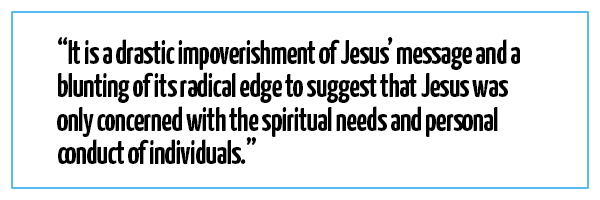 To sum up thus far: Once we cast off the modern blinkers we bring to the gospel story, it becomes clear that Jesus’ message of the dawning kingdom of God had significant political implications. His announcement that God’s long awaited reign was now asserting itself in the world, and his consequent summons for people to rally to the flag, had, as Wright observes “far more in common with the founding of a revolutionary party than with what we now think of as either ‘evangelism’ or ‘ethical teaching’”.[14] It is a drastic impoverishment of Jesus’ message and a blunting of its radical edge to suggest that Jesus was only concerned with the spiritual needs and personal conduct of individuals. The most fatal objection to this familiar portrait of Jesus is that it fails utterly to meet the criterion of crucifiability. As William Herzog observes:
To sum up thus far: Once we cast off the modern blinkers we bring to the gospel story, it becomes clear that Jesus’ message of the dawning kingdom of God had significant political implications. His announcement that God’s long awaited reign was now asserting itself in the world, and his consequent summons for people to rally to the flag, had, as Wright observes “far more in common with the founding of a revolutionary party than with what we now think of as either ‘evangelism’ or ‘ethical teaching’”.[14] It is a drastic impoverishment of Jesus’ message and a blunting of its radical edge to suggest that Jesus was only concerned with the spiritual needs and personal conduct of individuals. The most fatal objection to this familiar portrait of Jesus is that it fails utterly to meet the criterion of crucifiability. As William Herzog observes:
If [Jesus] had been the kind of teacher popularly portrayed in the North American church, a master of the inner life, teaching the importance of spirituality and a private relationship with God, he would have been supported by the Romans as part of their rural pacification program. That was exactly the kind of religion the Romans wanted peasants to have. Any belief that he encouraged … withdrawal from the world of politics and economics into a spiritual or inner realm would have met with official approval.[15]
But that is not what happened. Instead Jesus and his movement were perceived by the imperial and colonial authorities to be a political time bomb that urgently needed defusing, and for very good reason. To understand why, it is important to recognize the methodology Jesus used to make political comment and work for social change, since the political options open to Jesus were quite unlike those open to us in liberal democratic societies.
Read the next instalment in this series here. This article originally appeared in On The Road 32.
[1] I borrow this helpful analogy from Horsley, Jesus and Empire, 13.
[2] Matt 13:57/Mark 6:4, cf. Luke 4:24; Matt 8:28; Matt 16:14/Luke 9:19; Matt 21:11, 26; Mark 6:14–16/ Matt 14:1–2/Luke 9:7–9; Luke 7:16, 39–50; 13:33; John 1:21; 4:19; 6:14; 7:40, 52; Mark 14:65/Matt 26:68; Luke 22:64; 24:19; Acts 3:22; 7:37.
[3] Mark 6:4/Matt 13:57; Luke 4:24/GTh 31; John 4:44; Luke 13:31-33. Jesus also regarded John the Baptist as a prophet: Luke 7:26/Matt 11:9; cf. John 1:22; Mark 11:27–33.
[4] For perhaps the most thorough recent analysis of judgment in Jesus’ preaching, see Marius Resier, Jesus and Judgment: The Eschatological Proclamation in its Jewish Context (Minneapolis: Fortress, 1997). See also Dale C. Allison, Resurrecting Jesus: The Earliest Christian Tradition and its Interpreters (New York: T & T Clark, 2005), 56–110.
[5] Mark 15:1–38; Matt 27:11–32; Luke 23:1–46; John 18:28–19:38.
[6] Horsley, Jesus and Empire, 7.
[7] See Mark 8:27–30, cf. 6:14–16. To be sure, Jesus deems John the Baptist to be “more than a prophet” (Luke 7:26/Matt 11:9). But significantly, Jesus is only once referred to as a prophet outside gospels (Acts 3:22). His significance transcended established prophetic categories.
[8] On different types of prophet in the first century, see Wright, Jesus and Victory, 153–55; Herzog, Jesus Justice, 51–60. See also Morna D. Hooker, The Signs of a Prophet: The Prophetic Actions of Jesus (London: SCM, 1997) and David R. Kaylor, Jesus the Prophet: His Vision of the Kingdom on Earth (Louisville: Westminster John Knox, 1994).
[9] Wright, Jesus and Victory, 203.
[10] See my fuller discussion in Beyond Retribution: A New Testament Vision for Justice, Crime and Punishment (Grand Rapids: Eerdmans, 2001), 16–30.
[11] On the tribute passage, see Wright, Jesus and Victory, 502–07; Herzog, Jesus Justice, 219–32; Richard A. Horsley, Jesus and the Spiral of Violence: Popular Jewish Resistance in Roman Palestine (Minneapolis: Fortress, 1993), 307–17.
[12] Contra Oscar Cullman, The State in the New Testament (London: SCM, 1957), 34–38; W.D. Davies, “Ethics in the New Testament”, Interpreters’ Dictionary of the Bible II:171.
[13] So Herzog, Jesus Justice, 231–32.
[14] Wright, Jesus and Victory, 301. This interpretation fits well with the way Walter Wink, and others, understand the strategy underlying Jesus’ injunctions in Matthew 5:21–48. For a brief account, see Wink, The Powers That Be: Theology for a New Millennium (New York: Doubleday, 1998), esp. 98–111.
[15] Quoted by Nelson-Pallmeyer, Jesus Against Christianity: Reclaiming the Missing Jesus (Harrisburg: Trinity, 2001), 236–36.
Prof Christopher Marshall is the Diana Unwin Chair in Restorative Justice in the School of Government at Victoria University in Wellington, New Zealand. He specialises in New Testament theology and ethics, peace theology and practice, and restorative justice (both theory and practice), and is an expert in the study of contemporary Anabaptist theology. His books include Beyond Retribution: A New Testament Vision for Justice, Crime and Punishment and Compassionate Justice: An Interdisiciplinary Dialogue with Two Gospel Parables on Law, Crime, and Restorative Justice.


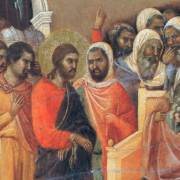

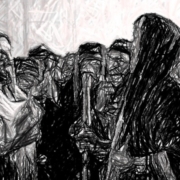
 There is no time to exegete either of these two passages in detail here.
There is no time to exegete either of these two passages in detail here. To sum up thus far: Once we cast off the modern blinkers we bring to the gospel story, it becomes clear that Jesus’ message of the dawning kingdom of God had significant political implications. His announcement that God’s long awaited reign was now asserting itself in the world, and his consequent summons for people to rally to the flag, had, as Wright observes “far more in common with the founding of a revolutionary party than with what we now think of as either ‘evangelism’ or ‘ethical teaching’”.
To sum up thus far: Once we cast off the modern blinkers we bring to the gospel story, it becomes clear that Jesus’ message of the dawning kingdom of God had significant political implications. His announcement that God’s long awaited reign was now asserting itself in the world, and his consequent summons for people to rally to the flag, had, as Wright observes “far more in common with the founding of a revolutionary party than with what we now think of as either ‘evangelism’ or ‘ethical teaching’”.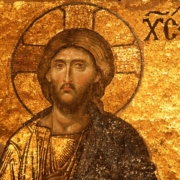
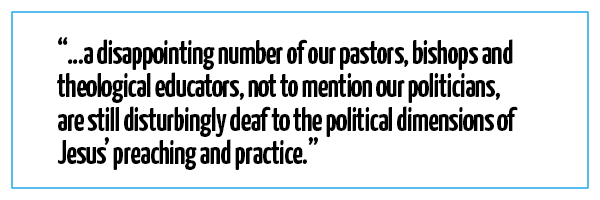 Thankfully the church no longer burns witches or deploys its own armies. But most confessing Christians, and a disappointing number of our pastors, bishops and theological educators, not to mention our politicians, are still disturbingly deaf to the political dimensions of Jesus’ preaching and practice, and to its far-reaching implications for shaping an authentically Christian political witness today. But why is this the case? Why do modern readers of the gospels still commonly, if not completely, miss the political ramifications of Jesus’ proclamation? And why is it that today’s Christian voice in the public square is so often bereft of any anchoring in the story of Jesus, whether explicit or implicit, thus allowing alternative sources of authority, such as conservative middle class values and morality, to fill the vacuum? Whence comes this depoliticised Jesus?
Thankfully the church no longer burns witches or deploys its own armies. But most confessing Christians, and a disappointing number of our pastors, bishops and theological educators, not to mention our politicians, are still disturbingly deaf to the political dimensions of Jesus’ preaching and practice, and to its far-reaching implications for shaping an authentically Christian political witness today. But why is this the case? Why do modern readers of the gospels still commonly, if not completely, miss the political ramifications of Jesus’ proclamation? And why is it that today’s Christian voice in the public square is so often bereft of any anchoring in the story of Jesus, whether explicit or implicit, thus allowing alternative sources of authority, such as conservative middle class values and morality, to fill the vacuum? Whence comes this depoliticised Jesus?